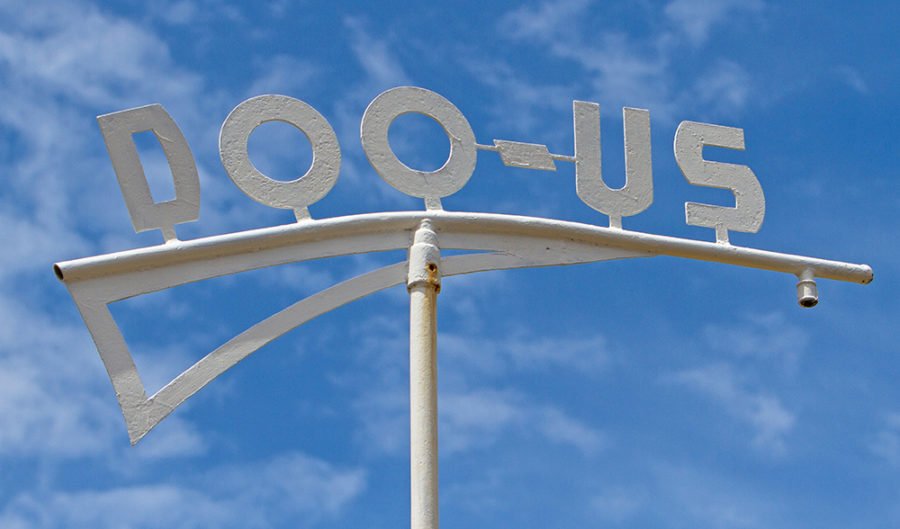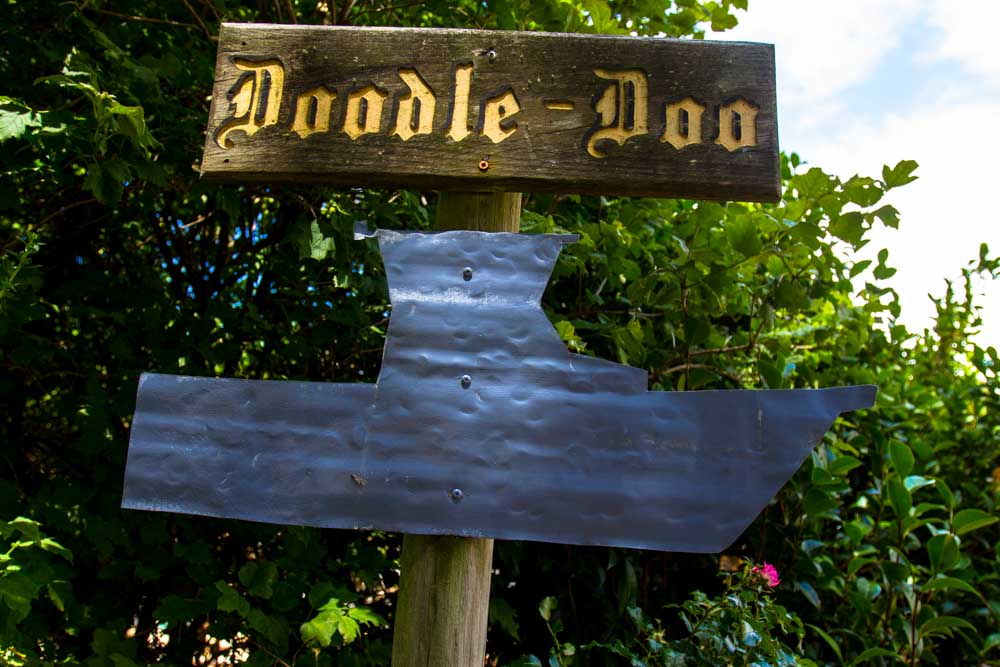Welcome to Doo Town

SAM NICHOLS IS ready. At 6am Pirates Bay is as calm as a pond, but a busy day beckons. The teenager has checked the fishing lines and – having got the nod from his father, Stuart, that everything is set for the day’s charter – is considering breakfast.
Sam’s an old hand. He’s caught fish all over Australia with his family. But this is the best place, no doubt. His father agrees. Stuart decided 20 years ago to toss his Hobart banking job and set up with his wife, Melinda, in their treasured Doo Town escape shack, named ‘Doodle Doo’. “The best thing my kids will tell you is that we live in the country but on the beach,” Stuart says.
Stuart’s guests arrive and board, and the Big Pig navigates out into what looks to be a perfect blue day.

(Image: Ian Connellan and Gail Maccallum)
By 10.30am a procession of cars proceeds through Doo Town and the Doo-lishus food van near the wharf is serving non-stop seaside fare. It’s common for Bev Millhouse, who owns the van with husband Phil, to churn through 80 litres of ice cream daily, and in the 2014/15 season they cooked 10 tonnes of chips – a potato peak eclipsed barely halfway through last summer. Bev used to roll paper cones for the crumbed fish but stopped when annual sales reached 50,000. “I was rolling for four and a half months straight,” she says.
Today an Ecuadorian family shares shade with a minibus-load of Chinese women, fashionable in floral hats. A people mover arrives and disgorges a clown-car’s worth of passengers. Bev understands why people come. She recently drove with Phil to Western Australia and back. It was pretty, she says, “but we were kind of disappointed. Phillip said to me: ‘Nothing’s probably better than what we’ve already got.’”
What they’ve got is a quiet community on Tasmania’s gorgeous south-eastern coast. In the 19th century this sandy promontory housed a sawmill and scattered cottages. Later, two guesthouses were built. But the Doo-dubbed shacks have their foundation in four Hobart friends buying land here in about 1940. Doo names date from then, although there’s debate about the first.

The first ‘Ittle Doo 4 Now’ was the caravan that Keith and Ruth Moon (above) kept on their Doo Town block for several years while building. (Image: Ian Connellan and Gail Maccallum)
According to Ruth Moon (owner of ’Ittle Doo 4 Now), who’s been winnowing history of the area, one version holds that Bill Eldridge bought one of the guesthouses and pronounced “This’ll do us” – naming his house to prove it. In another story, three of the friends sealed the deal Musketeer-like by naming their shacks ‘Doo I’, ‘Doo Me’ and ‘Doo Us’. Most tempting is the larrikin tale: after a rousing New Year’s Eve celebration, bleary residents awoke to find their shacks had been named overnight by the group’s bon-vivant, Eric Round. “That’s the story my father told me,” says Ruth. “It’s the one I set out to prove.”
Whatever the case, it was 1965 before the local council raised a Doo Town sign (regularly souvenired and currently attached to its pole with an arsenal of bolts). The town was only officially gazetted in 1972. The community currently stands at 38 Doo-named houses, with two more in nearby Penzance (“usurpers,” Ruth’s husband, Keith, says cheerfully). Now a stream of day-trippers traipse through the quirky shack town, clicking cameras at house signs, beach scenes, birdlife and happily roaming…deer. Yep, deer.
Tony Little and his wife, Jean (residents of ‘Highfield’…don’t blame them, the house was there before Doo-names were invented), have been farming here for four decades – first cattle and then wallaby. They started keeping deer to supply bucks for a game farm, but “there was more and more fence and more and more does and all of a sudden we had a lot of deer and nowhere for them to go”, says Tony.
In an era of increased interest in our food’s origins and the journey from paddock to plate, Doo-Town Game Meats goes one better, taking responsibility from birth to death – and beyond. Meat grown here is butchered onsite, with every part of the animal carefully sectioned. Blood collected at slaughter is kept for blood sausage; a meat-mecca of cuts is sculpted for specific restaurants, through to dice for sausages and locally made pies. Bones go to a local dog breeder. “Red water goes off the floor, that’s about it,” says Tony. “The only thing that doesn’t go is the grass and the paunch.”

Doo Towners combine rural and coastal lifestyles. Here, dog walkers join pied oystercatchers on Pirates Bay beach. (Image: Ian Connellan and Gail Maccallum)
Tony and Jean won’t farm forever, but they can’t imagine leaving Doo Town. “We’ve got everything we need,” says Tony, “all our wood, all our fish, all our meat. We eat the best you can get in the world.”
It’s Doo Town’s waters that incite the most passion: locals’ fishing chatter is more fervent than most trainspotters’ ardent locomotive gabble. Lines, lures, locations and memorable catches roll off tongues, peppered with Pidgin patois – wobbler, popper, mako, morwong. Blue fin, yellow fin and skipjack tuna are common here in season, along with kingfish, a wide variety of shark and species deemed more mundane: flathead, trevally and crays, among them. “The coastline’s like nothing else,” says Scott Johnson (‘Barber Doo’), a 30-year resident and charter-boat operator. “People have their own thing; some people like motorcycles, or golf. I don’t see it. For me it’s fishing. Always has been, always will.”
It’s enough to convert a person, and for us the day ends as it began, on Pirates Bay wharf. Mackerel leap onto lines so often that, in soft light, the catch makes the cement pier look as though it’s rippling. One young man basks in his first ‘two-fer’ – a fish each on two of his line’s five hooks. Other fisherfolk are intent on the fine art of squid jigging – tugging shrimp lures to mimic injury and attract cephalopods for a fatal feed.
“The boys like mackerel – it’s all bang and buck – but me, I don’t mind squid,” says an empty-bucketed jigger. “Some days you’ll cast the line in five times and get five squid, then you’ll cast it for an hour and get nothing. But that’s okay. It’s why they call it fishing and not catching, right?”
Bearings: Doo Town
Postcode: 7179
Houses with a ‘Doo’ name: 38
Population: 230
World record southern bluefin tuna caught in these waters: 108kg (on a 15kg line)
World Heritage sites a short journey from Doo Town: Port Arthur, Coal Mines and Darlington Probation Station
A selection of Doos: Dr Doolittle, Thistle Doo Me, Toucan Doo, Doo-N-Time, Doo-Fish, Doo Mee, Doo Write, Bonnie Doo-n, Af-2-Doo, Didgeri-Doo, Doodle Doo, Doo Drop Inn, Ittle Doo 4 Now, Doo Love It, Doo Nix, Doo Us, Gunnadoo, Just Doo It, Make Doo, Much-A-Doo, Rum Doo, Sheil Doo, Wattle-I-Doo, Wee Doo, Xanadu, Yabba Dabba Doo
This article was originally published in the Nov-Dec 2016 issue of Australian Geographic (AG#135).

